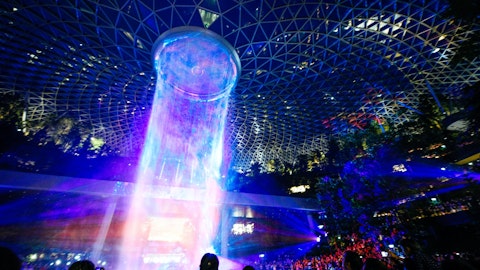Divya Goyal: Good morning guys. I wanted to get some color on some of the industries where you think Alithya is currently not servicing and untapped from that side, so are there certain industries where you’re looking to grow and expand? You did provide quite a lot of color in some of the previous questions, so if you could elaborate on that.
Paul Raymond: Yes, thanks Divya. There’s a few sectors right now that we see where we’re already there but we see tremendous opportunity for growth. One is healthcare and health insurance, so in Canada and the U.S., it’s a little bit different, but we see significant opportunity for growth in the healthcare industry both on the provider side and the payor side. It’s an industry that’s going through tremendous transformation right now. We’re very well positioned – as you know, we’re the top player in healthcare at Oracle on that side. We also are involved on the Microsoft side with some of these hospitals, and with the Datum acquisition that we did, we’re very involved on the payor side and the modernization side, and this is an area where we actually use artificial intelligence to accelerate the modernization of a transformation and where we provide it as a subscription-based service.
Again, we see a big upside for that, and as you saw from the growth in our subscription-based revenue, it’s also a very hard margin, repeatable solution that we like. Healthcare is definitely–healthcare, both payor and provider, is an area that we see tremendous growth for us going forward. This might sound counterintuitive, but I think there is going to be some growth opportunities in banking as well. I think the RPA offering that we have is going to become extremely popular in the next 12 to 24 months in the banking industry, so we’re staying very close to that one. The telecom industry is also not finished with its consolidation. We’re seeing some significant projects happening there, so I think that’s an area that we can do a lot more.
Finally manufacturing, our Microsoft business just had a stellar few months of bookings, so we think the whole process manufacturing side of the house is also another area we can–even though we’re number one in Microsoft in that area in North America, we think we can do better there as well.
Divya Goyal: That’s definitely good color, and definitely good improvement there. You briefly mentioned, Paul, about the Quebecor Freedom Mobile acquisition and the potential projects that could come out of that. Are those potentially baked into your bookings numbers right now, and could you quantify them at all, or would that come later as they start to integrate?
Paul Raymond: Some are in already, Divya, but some we’re still–we want to make sure before we put them into the backlog that it follows our definition of hard backlog. I think we’re conservative right now, but it’s not going to differ materially.
Divya Goyal: That’s helpful. One last one here on the integration, so for the Datum and the Vitalyst, have those acquisitions, or any of the other previous acquisitions, have they all now been integrated or are you still in the process of completing the integration?
Paul Raymond: We track integrations on multiple different levels – the administrative stuff, the benefits, the email infrastructure, the tools, the financials, the sales operations, so there’s a lot of different levels of integration. All of the operational stuff, so how we go to clients and integrate it, the management team, the emails, the access to the tools, that’s done. There’s always some stuff to do especially around our financial systems, because you want to make sure that the employees who are coming onboard aren’t penalized in the change, in the transition, and as you know, depending on which time of the year you transition into the systems, the resets with the IRS and the Canadian equivalent can mess up somebody’s paycheck pretty bad, so we try to avoid that.
Typically we do those on January 1 or April 1, when we have our systems at the end of the fiscal year, so we usually do those once a year based on the calendar. No, the integrations are going according to plan.
Divya Goyal: That’s perfect. Thanks a lot for taking my questions. I’ll pass the line.
Paul Raymond: Thanks Divya.
Operator: Thank you. There are no further questions. I will now turn the call back over to Paul Raymond for closing remarks.
Paul Raymond: Thank you Alara. Thank you everybody for joining us today – merci beaucoup. Looking forward to talking to you soon.
Follow Alithya Group Inc (NASDAQ:ALYA)
Follow Alithya Group Inc (NASDAQ:ALYA)
Receive real-time insider trading and news alerts





